Since capybaras are classified as exotic animals, many have been made to think they are dangerous. Capybaras are not dangerous, and they cannot kill humans. They are one of the most gentle and friendliest animals you can ever find.
However, a capybara can get aggressive if harmed or threatened. Any attempt to get rough or violent with them will trigger aggression from the rodent. Capybaras dislike rough play, and they could bite or injure you if threatened.
Therefore, it is important to respect their boundaries in your relationship with capybaras because they are peace-loving animals. In this post, we will see whether or not capybaras are dangerous to humans or can kill their owners.
What Are Capybaras?
Capybaras are the largest rodents known to man. They are herbivorous; they feed on fruits, grasses, water plants, and vegetables; they don’t feed on meat and won’t attack humans or animals for food. Capybaras are semi-aquatic and love staying close to water sources such as streams, ponds, swamps, rivers, and lakes.
Capybaras are shy and docile creatures. It is highly unlikely for a capybara to strike or attack except if it feels threatened. Capybara bites can leave wounds on your skin, and if left untreated, these bites could cause negative health consequences. Remember that capybaras grow in the wild, and is likely for them to carry diseases.
Therefore, it’s wise to maintain your distance or be friendly to them. Capybaras can get scared when startled, so you want to make sure you are calm around them.
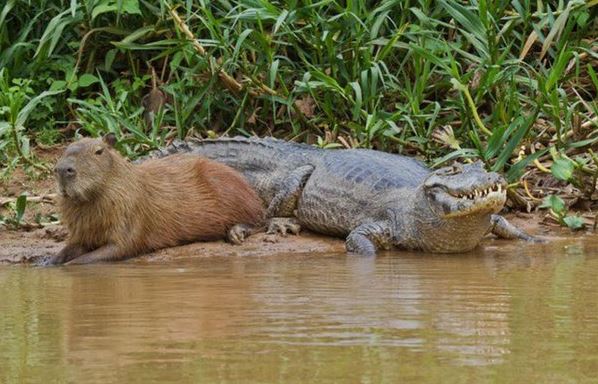
Crocodiles, turtles, ducks, and varieties of monkey species and birds are close friends to the friendliest rodents in the animal kingdom, Capybara. A common capybara can weigh 200 pounds. With a serious – almost stoic – gesture and its four heavy fingers on each of its legs, it could pass for being a ferocious rodent living in perfect solitude, enjoying the quagmire in the humid forests of Latin America.
Nature tells another story.
Science does not yet have an answer to explain why these animals are so well-received among various wild species.
One of the explanations that have been given is his always gentle character. In general, they are not aggressive animals, nor are they distinguished by making a lot of noise. As they are excellent swimmers, other smaller animals use them as a “bus” to cross moving bodies of water.
The weird nature of these animals has turned to spur people to make Memes out of them. Like almost all the virals on the internet, the important thing is not how they arose but how much they entertain us; that is why you should check out a collection of the best memes, photos, and videos of capybaras, which with their tenderness and relaxation, which invaded all our social networks.
This animal is so friendly is sometimes a pet. But can’t it harm or kill a human?
READ MORE: Why Are Capybaras So Friendly? – [Answered]
Life Of Capybaras
Capybaras can live on land and water. It is very well-equipped to operate in both environments. Its legs, short and robust, are partially webbed, which makes it an excellent swimmer.
Its ears, eyes, and nostrils, perfectly aligned, allow it to remain immersed for hours, leaving only the top of the head protruding like the beaver or the hippopotamus.
It is very social! It lives in groups of 10 to 30 individuals, with a dominant male, females, their offspring, and young males. To mark its territory, it has a fragrant substance secreted by a frontal gland (this sometimes deters predators) And in the troop, they know how to play collectively.
Babies can be entrusted to one of the adults, and a lactating female sometimes allows herself to be suckled by young from the same clan.
The young capybara is born completely hairy and weighs a kilo at birth. A few hours after birth, he can run, swim and dive. He only suckles his mother for a few weeks; within a month, he grazes along with the rest.
Hunted for their meat and their leather and frowned on for the damage they inflict on farms, the Capybaras populations have remained relatively stable.
What Animals Do Capybaras Hang With?
Of course. Absolutely. From the introduction of the post, you can tell. A truly gentle soul, Capybaras are friendly to almost all animals. The Internet is filled with pictures of Capybaras cuddling with many other animals.
It is friendly to turtles, birds, cats, other rodents (like beavers and squirrels), and dogs. Gosh, it’s so cool; it even hangs out with crocodiles!
His best pal, however, is the monkey. The monkey and some birds use them as a public transport system clinging to their backs as they walk along the grassy path. I would like to see a Disney movie with a Capybara as the main character, won’t you?
But not all animals share this happy-go-lucky attitude of the Capybara. Large cats and giant snakes snack on this adorable rodent. Pumas and Boa constrictors, other than man, are the natural predators of the Capybara. They aren’t happier to see this docile animal.
Are Capybaras Friendly To Humans?
Capybaras don’t mind being around humans. It responds well to being in contact with him and enjoying his company. Capybaras are intelligent animals and know when humans are being extreme with them. Ensure you keep a reasonable distance from or best avoid physical contact with capybaras, especially if they are young.
If you must interact with capybaras, respect their boundaries and be as friendly as possible because they can bite or attack if provoked. Unlike other animals in the wild, capybaras lack any physical characteristics that make them a threat to humans.
Attracted by its look and down-to-earth attitude, Americans are adopting it as a pet. Sometimes, they dress it up, take pictures, and post it on social media. This animal doesn’t mind one bit!
Other than pets, people keep Capybara because of their meat and skin. Its meat rates are like pork and can supplement beef. Oils can be derived from their skin and used for treating joint pain. Its teeth are also used in necklaces as a souvenir for tourists.
Capybaras don’t mind being around humans. It responds well to being in contact with him and enjoying his company. It is intelligent enough to understand what a leash is and learns as fast as a dog or cat.
At What Point Will Capybaras Attack Humans?
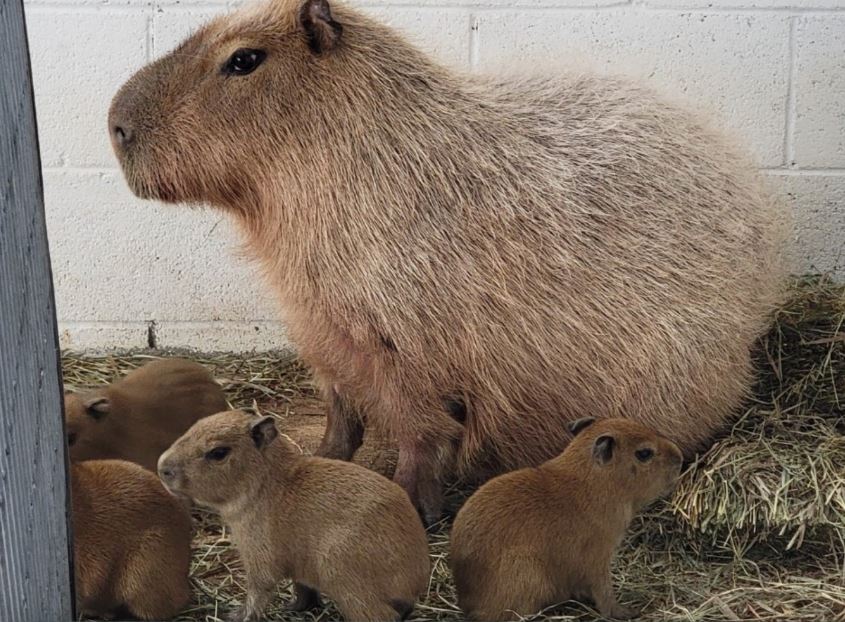
Indeed, Capybaras can attack a human being. Like all other wild animals, they defend themselves when they feel threatened, unsafe, or agitated. But since it is an herbivore, it would only attack if it really needs to. How it acts in the wild differs from when it is domesticated.
To defend himself in the wild, he uses his large and powerful incisors to bite the source of his irritation.
Their teeth grow by as much as 0.3 mm per day. For this reason, they gnaw all day to keep their teeth short. His bite is very powerful. Its bite power can rival that of a tiger. So you don’t want to be at the end of that.
No matter how domesticated they are, Capybaras are still wild animals, so you should be careful with them. They won’t like the rough play you would normally do with a dog.
ANSWERED: Can I Own A Capybaras In The United States?
Their temperaments differ, too, so you should know which kind you are dealing with. As long you don’t move suddenly, startle them or irritate them, they won’t attack.
Why Do Capybaras Attack Humans?
A capybara can bite a human if it provokes or threatens it. They are trusting, alright, and docile, but they can become violent when you threaten them, especially if they are newly adopted and they have not totally trusted you.
If you grab them suddenly or run towards or after them, they can become confused and may misunderstand your action. They may bite since it is their way of defending themselves in the wild.
Do Capybaras Carry Diseases?
Capybaras are known to carry a dangerous bacterial disease known as leptospirosis and tularemia. Leptospirosis can cause severe fever and headache to anyone who has it. Humans and animals can get infected with leptospirosis after coming in contact with the infected’s urine, saliva, or body fluids.
Since capybaras grow in the wild, they can carry diseases. However, there is little to no risk of getting infected with diseases. After getting your capybaras, keep them clean and practice good hygiene when in contact with them. You can do this by washing your hands after coming in contact with them.
Avoid contact with capybaras urine and feces. Also, if you have wounds yet to be healed, avoid touching them after coming in contact with a capybara.
Will A Capybara Bite You?
That is highly unlikely. These rodents are sweet and sociable. But like I said, don’t be fooled by that cute face; they would bite if they feel threatened.
Since they are domesticated, no predators are hunting them, so they are relaxed and would probably never bite until they are startled or threatened. You should be careful if they are newly adopted. Every animal takes time to adjust to new environments.
Docile or not, capybaras are still wild animals. And predicting the actions of a wild animal is up to chance. Because they are not accustomed to being pets, if they get scared, they will bite.
You should provide comfortable conditions for them in their new home to win their trust. Let them come to you instead of going to them. And they do. Pet them slowly and carefully.
READ MORE: Can Capybaras Be Kept As Pets?
A Capybara’s front teeth (gnawing teeth) continuously grow. That’s why they are constantly chewing on something. If they constantly chew, their teeth become blunt. This is necessary to prevent the animal from hurting itself and disfiguring the front of its mouth.
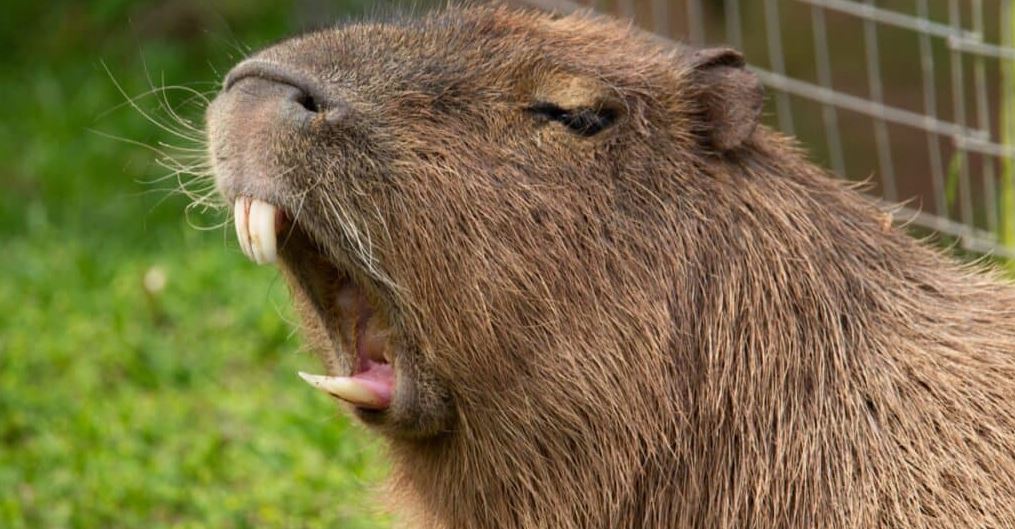
You must continually provide what he can chew, such as straw, backs, and grass. Capybaras’ sharp teeth are designed for eating fruits, nuts, seeds, plants, and grasses.
How Can Humans Avoid Being Bitten By A Capybara
Capybaras don’t do it for malice. They bite for defense or to show territoriality. Knowing that it is easy to avoid being on the naughty list of these relatively gentle animals. You are safe if you don’t try to harm or startle them or steal their precious females.
Remember, wild animals don’t like being tamed, so they try to resist domestication. You should be vigilant. Naturally, they won’t bite, so you will be okay if you don’t trigger them.
Yes, they could bite you as play, and it would be painful. That’s why you must always give them straw or grass to chew. Remember, their teeth grow permanently.
If they don’t have things to chew, they will eat anything they find. That’s why leaving them in the house all by themselves is a terrible idea. Else they can attack your sofa and redesign your living room!
So how do you avoid being bitten? Stay in your lane. No rough movements. Always remember that Capybaras are not tame animals. Wait for the animal to warm up to you and not the other way around during the bonding stage of your relationship.
Provide it with things to chew so it won’t switch to you or your stuff. As I said earlier, Capybaras bites on exceptional cases, so be sure you avoid the triggers, and you will be fine.
What Happens If A Capybara Bites You?
Yes. It’s unlikely that a Capybara would bite you. But there is a possibility. If you got bitten by this animal, the most important question to answer is, is it dangerous? Does it transmit any disease? In short, what happens if you get bitten by a Capybara?
Pain. That’s what would happen. You will be in extreme pain. Capybaras are rodents, and their teeth can be very sharp.
Worse, you can be infected by a disease. Capy bites are known to transmit tetanus and rabies on rare occasions. All measures should be taken to prevent a Capybara from biting you, but if it has happened, you shouldn’t worry much since it is treatable.
Treatment For Capybara Bites
The first thing to do is to stop the bleeding. This is how to do that.
- Apply pressure on the wound. You can use a clean cloth or tissue. If the cloth soaks, don’t stop until the blood stops. Apply more clothes or tissues until the blood stops.
- If it is on the arm or leg, raise it above ground while lying down. This would prevent blood flow to that part and slowly swim the bleeding.
- Visit the hospital immediately. Capybaras bites can cause severe deep cuts and should not be joked with.
Since they can transmit diseases, doctors should check the wound. Antibiotics such as amoxicillin and clavulanate potassium would be administered to prevent microbial infections.
READ MORE: How To Train A Capybara As Pet
Depending on the extent of the wound, you may need to be admitted to the hospital. Proper rest and correct heeding to the antibiotic prescription are necessary at this stage. It may take a few weeks to three months to fully recover.
How To Handle Your Capybara After He Bites You?
No need to stay far away from your pet Capybara just because it bit you. Of course, it was painful, and you took several weeks to heal, but you must know that this is why you must be closer to it.
The first thing to do after getting bitten by a capybara is to seek medical help. A medical practitioner will clean the wound and administer treatment when needed.
As mentioned, capybaras may have parasites and diseases, which can be transmitted by a single bite. This makes it imperative to see a medical practitioner after getting bitten.
Capybaras are social animals, and they take being ignored very seriously. One experience is not enough to ditch it. Many dog owners and cat owners get attacked by their pets, and they don’t leave it all alone. Turning a wild animal into your pet would have its challenges. It never meant to harm you and thought you were the enemy.
Don’t be harsh. Doing that would be counterproductive. They will get even more confused and bite you again. Don’t shout at them. They will get depressed. Capybaras are very emotional.
Beating them up will be regarded as animal cruelty. Why would you even think like that? Beating them up will make them turn aggressive towards you, and that’s the end of your relationship.
Your Capybara will reciprocate what he sees you do. If you are kind to him, he will be warm to you. If you are cruel, it will hate you too. It’s the simple law of karma. Nevertheless, you can avoid potential bites by respecting the rodent’s boundaries and being calm with them.
How To Avoid Getting Bitten By a Capybara
Avoid threatening or provoking your capybara. Below are some tips to avoid getting bitten by your Capybara pet.
- Don’t approach the adult male in its mating season because their hormones can make them aggressive in this period.
- Avoid coming in contact with the young capybaras’ babies, especially with their mothers nearby.
- Don’t touch a sleeping capybara. Capybaras are shy and can feel vulnerable, and any slight movement can be interpreted as a threat.
- Don’t try to touch an eating capybara, especially an adult one.
How To Improve Your Relationship With Your Pet Capybara
If you want to reduce the aggressiveness of your capybara pet, you should become more friendly to them. Capybaras are peaceful and intelligent animals and can be less aggressive if you do the following things:
1. Spend Quality Time With Them: Capybaras need your company, so spend some time with them. Cuddle them and embrace them while you can.
2. Respect Their Borders: While you spend quality time with time, giving them the privacy and space to roam and develop is also important. Ensure the room or place you keep them is safe and wide enough for them to explore.
3. Provide Good Nutrition: Capyabaras need nutritious meals to stay healthy. Find your capybara’s favorite food and ensure it is well-fed.
With these tips, your capybara will be a healthy and friendly pet.
Conclusion
Like any other animal, these large rodents can bite you if threatened. Don’t forget being a pet is a new experience for them, and they are not familiar with what being a pet is all about.
Be sharp with them. Mostly when first adopted. If they are comfortable with their owner, they might turn to their instinct of biting.
If you don’t confuse them, they remain their docile self. It’s best to avoid rough play and sudden grabbing when they are still getting used to you and your environment. Don’t provoke them, and they will be cool with you.
If you get bitten, stopping the blood is the first thing. Then you can go and get an appointment with the doctor. Let him check the wound and administer antibiotics If need be.


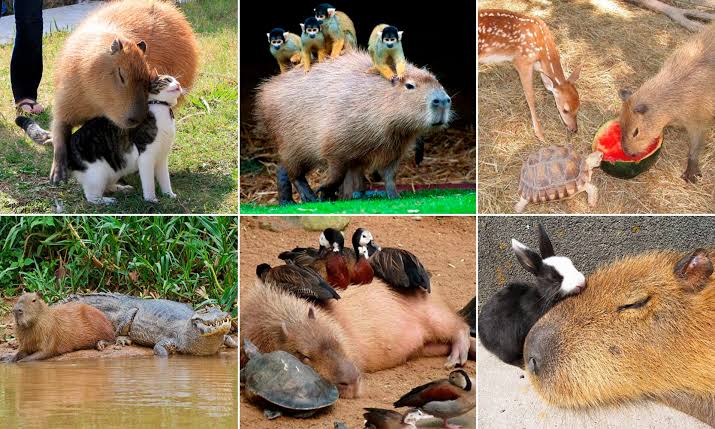


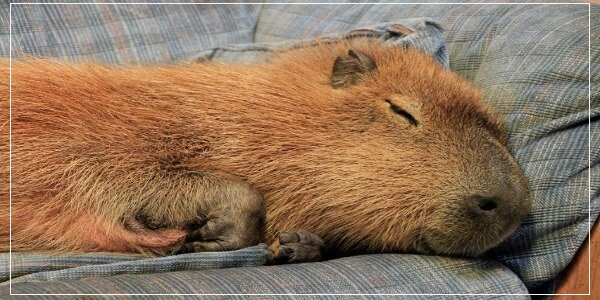


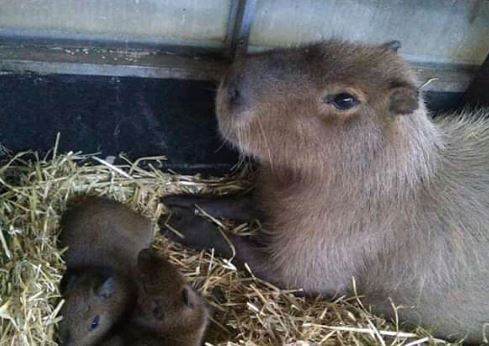
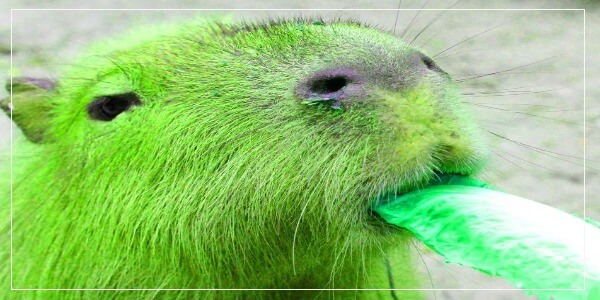
it is legal to have a capybara in france